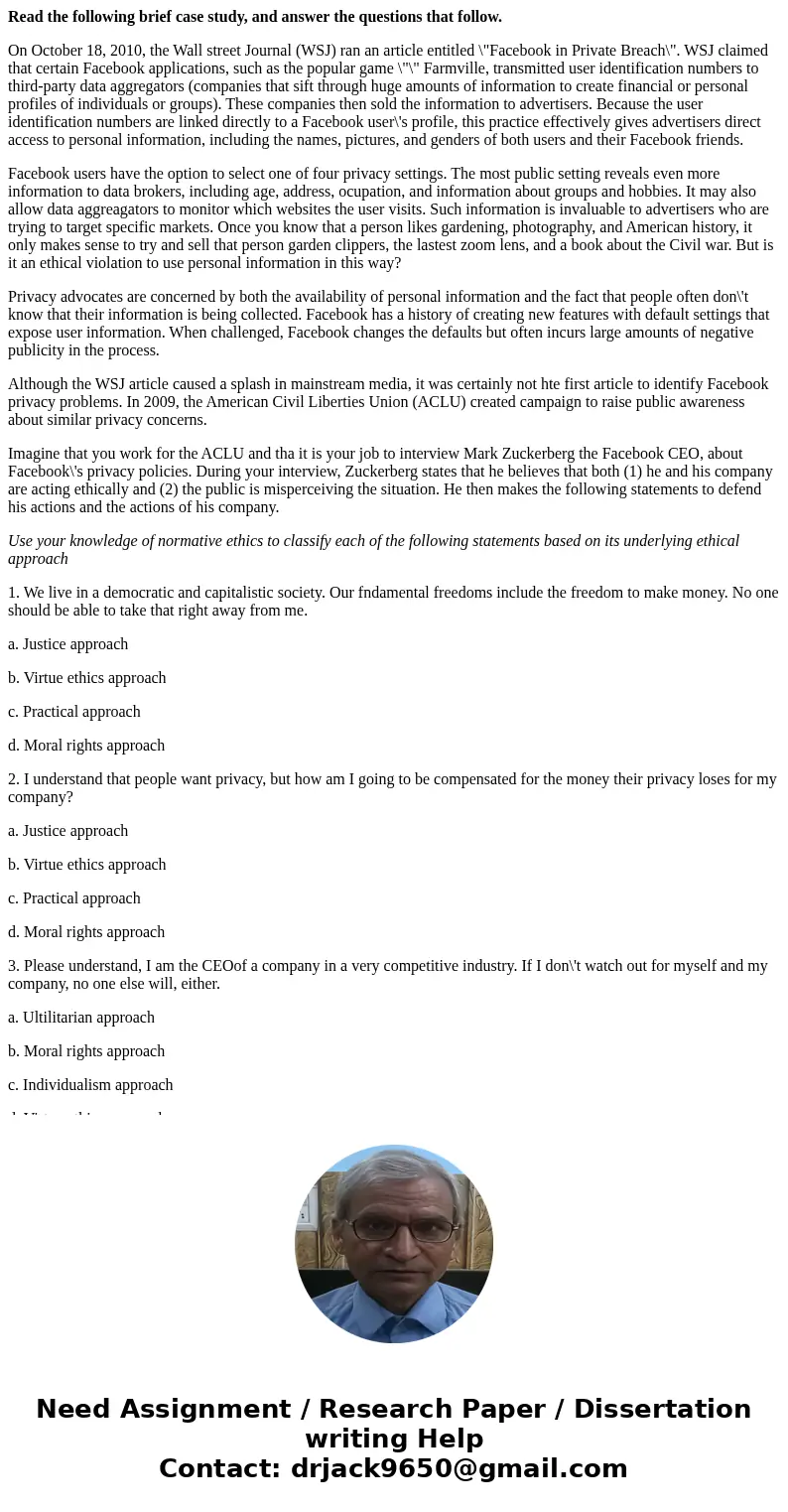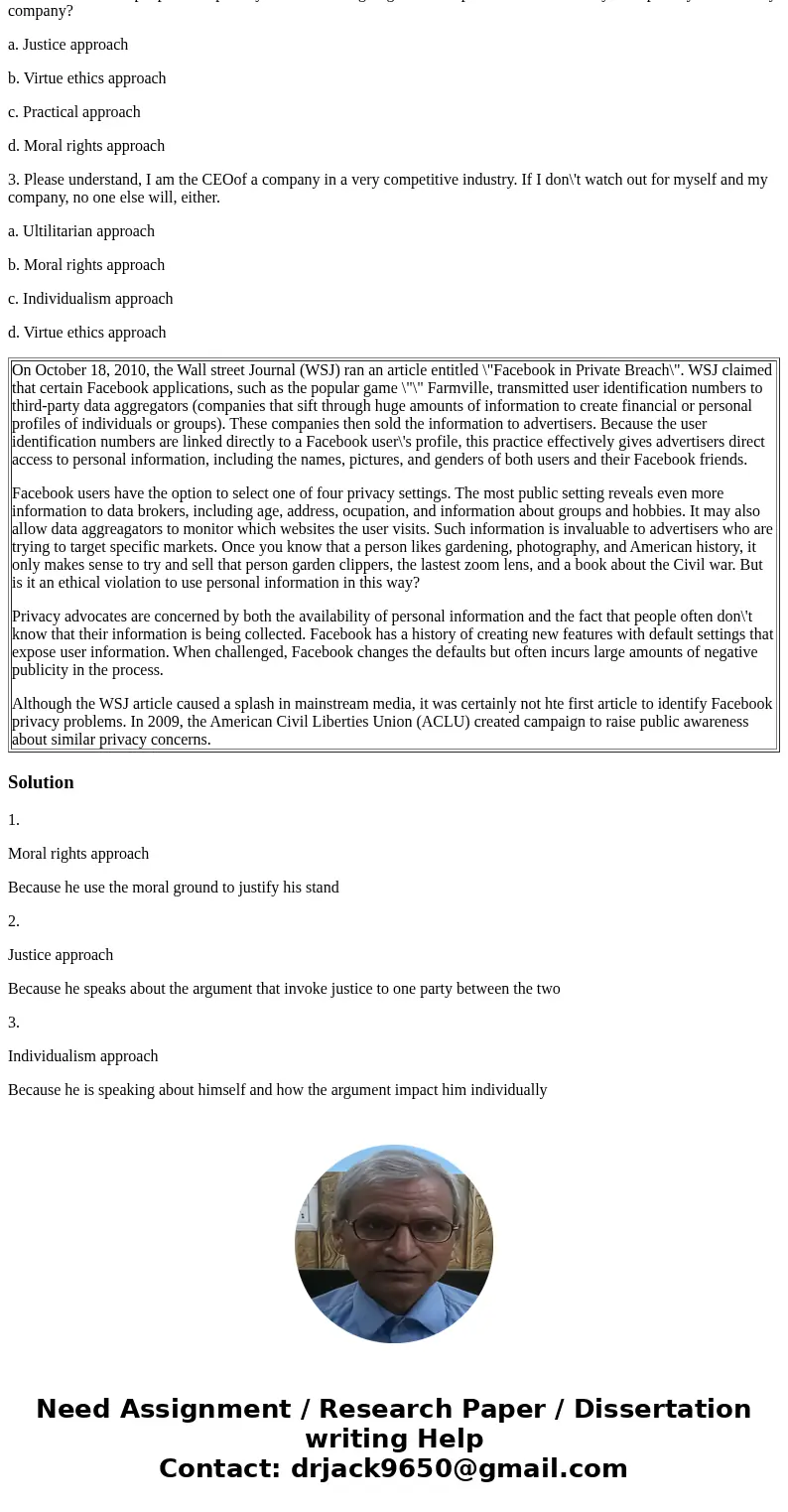Read the following brief case study and answer the questions
Read the following brief case study, and answer the questions that follow.
On October 18, 2010, the Wall street Journal (WSJ) ran an article entitled \"Facebook in Private Breach\". WSJ claimed that certain Facebook applications, such as the popular game \"\" Farmville, transmitted user identification numbers to third-party data aggregators (companies that sift through huge amounts of information to create financial or personal profiles of individuals or groups). These companies then sold the information to advertisers. Because the user identification numbers are linked directly to a Facebook user\'s profile, this practice effectively gives advertisers direct access to personal information, including the names, pictures, and genders of both users and their Facebook friends.
Facebook users have the option to select one of four privacy settings. The most public setting reveals even more information to data brokers, including age, address, ocupation, and information about groups and hobbies. It may also allow data aggreagators to monitor which websites the user visits. Such information is invaluable to advertisers who are trying to target specific markets. Once you know that a person likes gardening, photography, and American history, it only makes sense to try and sell that person garden clippers, the lastest zoom lens, and a book about the Civil war. But is it an ethical violation to use personal information in this way?
Privacy advocates are concerned by both the availability of personal information and the fact that people often don\'t know that their information is being collected. Facebook has a history of creating new features with default settings that expose user information. When challenged, Facebook changes the defaults but often incurs large amounts of negative publicity in the process.
Although the WSJ article caused a splash in mainstream media, it was certainly not hte first article to identify Facebook privacy problems. In 2009, the American Civil Liberties Union (ACLU) created campaign to raise public awareness about similar privacy concerns.
Imagine that you work for the ACLU and tha it is your job to interview Mark Zuckerberg the Facebook CEO, about Facebook\'s privacy policies. During your interview, Zuckerberg states that he believes that both (1) he and his company are acting ethically and (2) the public is misperceiving the situation. He then makes the following statements to defend his actions and the actions of his company.
Use your knowledge of normative ethics to classify each of the following statements based on its underlying ethical approach
1. We live in a democratic and capitalistic society. Our fndamental freedoms include the freedom to make money. No one should be able to take that right away from me.
a. Justice approach
b. Virtue ethics approach
c. Practical approach
d. Moral rights approach
2. I understand that people want privacy, but how am I going to be compensated for the money their privacy loses for my company?
a. Justice approach
b. Virtue ethics approach
c. Practical approach
d. Moral rights approach
3. Please understand, I am the CEOof a company in a very competitive industry. If I don\'t watch out for myself and my company, no one else will, either.
a. Ultilitarian approach
b. Moral rights approach
c. Individualism approach
d. Virtue ethics approach
| On October 18, 2010, the Wall street Journal (WSJ) ran an article entitled \"Facebook in Private Breach\". WSJ claimed that certain Facebook applications, such as the popular game \"\" Farmville, transmitted user identification numbers to third-party data aggregators (companies that sift through huge amounts of information to create financial or personal profiles of individuals or groups). These companies then sold the information to advertisers. Because the user identification numbers are linked directly to a Facebook user\'s profile, this practice effectively gives advertisers direct access to personal information, including the names, pictures, and genders of both users and their Facebook friends. Facebook users have the option to select one of four privacy settings. The most public setting reveals even more information to data brokers, including age, address, ocupation, and information about groups and hobbies. It may also allow data aggreagators to monitor which websites the user visits. Such information is invaluable to advertisers who are trying to target specific markets. Once you know that a person likes gardening, photography, and American history, it only makes sense to try and sell that person garden clippers, the lastest zoom lens, and a book about the Civil war. But is it an ethical violation to use personal information in this way? Privacy advocates are concerned by both the availability of personal information and the fact that people often don\'t know that their information is being collected. Facebook has a history of creating new features with default settings that expose user information. When challenged, Facebook changes the defaults but often incurs large amounts of negative publicity in the process. Although the WSJ article caused a splash in mainstream media, it was certainly not hte first article to identify Facebook privacy problems. In 2009, the American Civil Liberties Union (ACLU) created campaign to raise public awareness about similar privacy concerns. |
Solution
1.
Moral rights approach
Because he use the moral ground to justify his stand
2.
Justice approach
Because he speaks about the argument that invoke justice to one party between the two
3.
Individualism approach
Because he is speaking about himself and how the argument impact him individually


 Homework Sourse
Homework Sourse